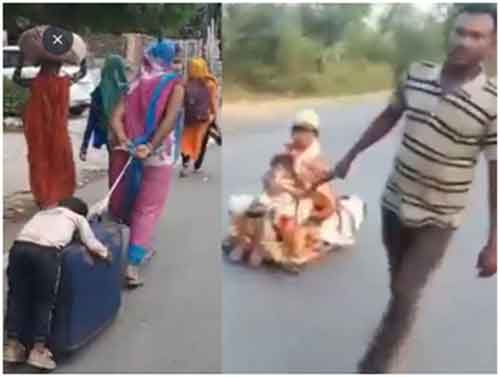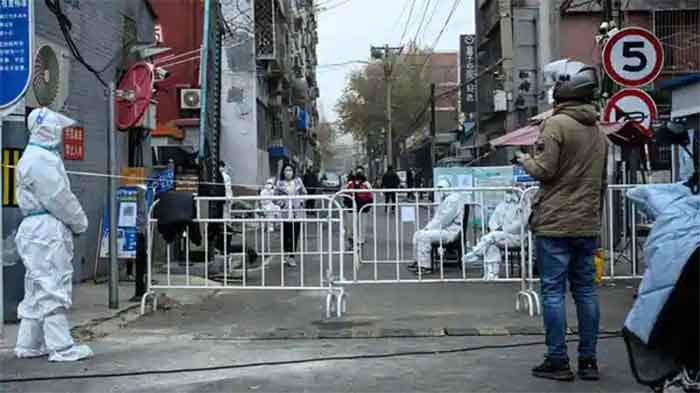Co-Written by Abass Rather & Aqib Yousuf

Covid-19 Pandemic has brought the world under a precarious situation as the millions of people have been rendered jobless. Over 122 million people in India lost their jobs in April, according to estimates from Centre for Monitoring Indian Economy. Around 75% of them were small traders and wage-labourers.
The sudden and unexpected outbreak of Covid-19 Pandemic and the subsequent announcement of lockdown made by the PM Narendra Modi caught everyone by surprise. In his announcement, he told people to draw Lakshman Rekha on their entry doors. “Just do one thing, stay at home! Today’s decision of countrywide lockdown has drawn a Lakshman Rekha around the door of your house,” said PM. Long queues were seen outside the shopping malls in urban areas in a race to hoard as much as one can just after the announcements.
The most vulnerable and worst hit by the Covid-19 Pandemic Lockdown are the migrant workers. This consists of construction workers, painters, delivery boys, cooks, cleaners and factory workers etc. These workers faced every kind of hardships from walking on foot hundreds of thousands of kilometres with minimal availability of food and water and being given inhuman treatment like beating with lathis to sprayed with disinfectant. It is roughly estimated that 79% of India’s migrants work for daily wages in factories or on construction sites. The Stranded Workers Action Network (SWAN) survey found that 50% of workers had rations left for less than one day. Seventy two percent of the people surveyed said that their rations would finish in two days. Ninety six percent had not received rations from the government and 70% had not received any cooked food. Around 98% had not received any cash relief from the government.
Was the Nationwide lockdown necessary to fight the battle against the Covid-19 Pandemic? The answer to this was in affirmative from the medical fraternity who knows the gravity of the virus. However, taking such a grave decision, needed thorough planning before the implementation. The diverse sections of the society must be taken into the consideration. India is a country of approximately 1.35 billion people and difference in the economic and social status is quite obvious and visible. Did PM Narendra Modi and his cabinet take the most vulnerable and marginalised section of the society into consideration before taking the decision of nationwide lockdown? The answer to this was negative from the social, political and economical experts. The announcement came at 8pm to be implemented in the midnight, thus giving only four hours to people to prepare. Only the middle and upper strata of society did some preparation. PMs plea to the people to stay at home is itself self explanatory that he was unaware about the presence of such a huge mass of migrant workers who stayed out of their homes to earn for their livelihoods. It is pertinent to mention that these migrant workers left their houses in search of jobs to feed family and themselves.
Tens of Thousands of workers decided to use whatever means they have at their disposal to reunite with their families at home. Some use cycles to cover the distance and majority had no option but to walk and suffer. The presence of the struggling instinct in the workers encourage them to use the hardest method to arrive home. The closure of all means of transport by the govt did not hamper the courage of workers. In some circles of the society particularly from those circles who backed this unplanned nationwide lockdown criticised the movement of the migrant workers. Their defiance was seen as a threat to the nation. Police was used against them and they were lathi charged and beaten at many places. The miseries does not end here. It is rather a beginning of the protracted period of misery. They faced unnatural deaths. According to researchers Thejesh G.N., Kanika Sharma and Aman, till Saturday, 378 people had died since the lockdown was imposed due to reasons other than the disease. Of them, 69 people died in rail or road accidents while walking to their homes –These include deaths due to starvation and financial distress, exhaustion, accidents during migration, lack or denial of medical care, suicides, police brutality, crimes, and alcohol-withdrawal.
Sixteen migrant workers were butchered by an empty goods train in Maharashtra’s Aurangabad district. While 14 of them died on the spot, two of them later succumbed to injuries. These workers were sleeping on the railway line after getting exhausted while walking from Jalna to Bhusawal to board a ‘Sharmik Special’ train to return to Madhya Pradesh. Their choosing of railway track to get away from the punishment of policemen proved to be lethal.
Govt is duty bound to safeguard the life and livelihoods of each and every citizen of the country. Govts lack of proper planning in handling the crisis of migrant workers puts a question mark on the performance of the govt during Covid-19 Pandemic. This huge section of india’s life force is being deprived off their rights as equal citizens. The suspension of trains which is being considered as the cheapest means of transportation forced migrant workers whose pockets were short of money and were more vulnerable to the virus due to the lack of hygienic accommodations to take the desperate measures to reach the safest place. Mismanagement by both centre and state govts left no option for these stranded migrant workers to use the life threatening measure.
The arbitrarily and unplanned implementation of lockdown put hundreds of thousand migrant workers in danger of starvation and mental trauma as they lost the jobs on which they depended for survival.
The Govts callous approach in strengthening and looking after the workers laws aggrevates their sufferings. The Building and Other Construction Workers (Regulation of Employment and Conditions of Service) Act, 1996, or BOCW, acknowledges the seasonality and precarious nature of employment and defines anyone who worked in the construction industry for 90 days in the past year as a construction worker. This law provide housing and child care facilities to workers and obliges state construction boards to register workers as beneficiaries of several welfare measures. However, each worker needs to be registered as a construction worker to avail the benefits. The large section of the migrant workers are neither documented nor unionised. Thus the law ignores this huge section of the workers.
The study conducted by Jan Sahas finds that more than 90% of the construction workers they interviewed were outside the ambit of this act since they do not have BOCW cards. In this situation, the central government directive to the state governments to use the collected BOCW cess funds to aid workers during the lockdown becomes useless.
The Inter-State Migrant Workers Act, 1979, the only law for migrant workers which regulates and law down the conditions of service of Inter-State Migrant Workers. This acts makes it mandatory for the registered contractors to maintain a record of their migrant workers. However, the 2011-12 report of the Standing Committee on Labour states that eleven state do not have a single employer or contractor registered under this act.
Exemplary role played by Kerala Govt:
The wide appreciation of Kerala model both at national and international level is the recognition to the fact that things could have been better for migrant workers had the centre planning to tackle migrant workers been done properly. The Kerala model is based on humane treatment which treats migrants as ‘guest workers’. Kerala government organised 15,541 relief camps for migrant workers, the highest in any State. Kerala govt decision to feed everyone and make sure no migrant worker dies due to starvation, community kitchens at the panchayat level are established through out the state. Night shelters, educational allowances for children, health care benefits and financial support to ferry the mortal remains in case of natural death is also provided by the Kerala government to the migrant workers.
The economic development of India depends on migrants who played the significant role in the labour force in the construction and manufacturing sectors.
The world bank said in a report that the lockdown in India has impacted the livelihoods of a large proportion of the country’s nearly 40 million internal migrants. Around 50,000–60,000 moved from urban centers to rural areas of origin in the span of a few days. Keeping in view the quantum of sufferings these migrant workers faced during the lockdown, their returning to the urban centres seems to be unrealistic immediately after the lifting of lockdown. This will have a greater impact on the economic development of India.
Abass Rather is a socio-political activist and Aqib Yousuf is a student of law at Kashmir university. Both resides in South Kashmir’s Kulgam district
SIGN UP FOR COUNTERCURRENTS DAILY NEWS LETTER














































